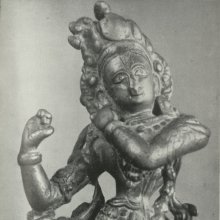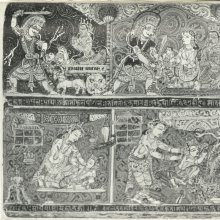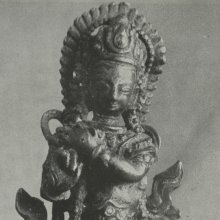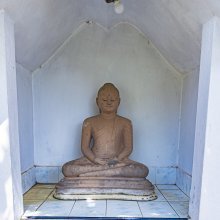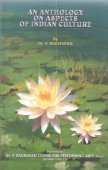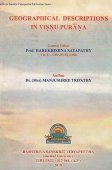Mrish, Mṛś, Mṛṣ: 7 definitions
Introduction:
Mrish means something in Hinduism, Sanskrit. If you want to know the exact meaning, history, etymology or English translation of this term then check out the descriptions on this page. Add your comment or reference to a book if you want to contribute to this summary article.
The Sanskrit terms Mṛś and Mṛṣ can be transliterated into English as Mrs or Mrish, using the IAST transliteration scheme (?).
Images (photo gallery)
(+10 more images available)
Languages of India and abroad
Sanskrit dictionary
Source: DDSA: The practical Sanskrit-English dictionaryMṛś (मृश्).—6 P. (mṛśati, mṛṣṭa)
1) To touch, handle.
2) To rub, stroke.
3) To consider, reflect, deliberate.
--- OR ---
Mṛṣ (मृष्).—I. 1 P. (marṣati) To sprinkle. -II. 1 U. (marṣati-te)
1) To bear, endure &c. (usually 4 U.).
2) To sprinkle. -III. 4, 1 U. (mṛṣyati-te, marṣayati-te, marṣita)
1) To suffer, bear, endure, put up with; न मर्षयन्ति चात्मानं संभावयितु- मात्मना (na marṣayanti cātmānaṃ saṃbhāvayitu- mātmanā) Rām.6.65.4; तत्किमिदमकार्यमनुष्ठितं देवेन-लोको न मृष्यतीति (tatkimidamakāryamanuṣṭhitaṃ devena-loko na mṛṣyatīti) Uttararāmacarita 3; R.9.62.
2) To allow, permit.
3) To pardon, forgive, excuse, forbear; मृष्यन्तु लवस्य बालिशतां तातपादाः (mṛṣyantu lavasya bāliśatāṃ tātapādāḥ) Uttararāmacarita 6; प्रथममिति प्रेक्ष्य दुहितृजनस्यैकोऽपराधो भगवता मर्षयितव्यः (prathamamiti prekṣya duhitṛjanasyaiko'parādho bhagavatā marṣayitavyaḥ) Ś.4; आर्य मर्षय मर्षय (ārya marṣaya marṣaya) Ve.1; महाब्राह्मण मर्षय (mahābrāhmaṇa marṣaya) Mṛcchakaṭika 1.
4) To forget, neglect.
Source: Cologne Digital Sanskrit Dictionaries: Shabda-Sagara Sanskrit-English DictionaryMṛś (मृश्).—[(au) mṛśau] r. 6th cl. (mṛśati) 1. To touch. 2. To see, to perceive. 3. To consult, to consider, to deliberate. With parā, to counsel, to advise. With vi, 1. To consider, to discuss. 2. To touch. 3. To observe. 4. To examine.
--- OR ---
Mṛṣ (मृष्).—r. 1st and 10th cls. (marṣati-te marṣayati-te) and 4th cl. (mṛṣyati-te) 1. To bear, to suffer, to endure patiently. 2. To permit. 3. To pardon. (u) mṛṣu r. 1st cl. (marṣati-te) To sprinkle. With āṅ, To be angry. With vi, To be distressed, to bear hardly.
Source: Cologne Digital Sanskrit Dictionaries: Benfey Sanskrit-English DictionaryMṛś (मृश्).— (often confounded with mṛṣ), i. 6, [Parasmaipada.] (in epic poetry also [Ātmanepada.], [Rāmāyaṇa] 2, 62, 18). 1. To touch, to stroke. 2. To think, to consider.
— With the prep. anu anu, To consider, [Rāmāyaṇa] 2, 11, 9.
— With ava ava, [Causal.] To trouble, [Bhāgavata-Purāṇa, (ed. Burnouf.)] 4, 7, 48.
— With ā ā, 1. To touch, [Śiśupālavadha] 9, 34. 2. To destroy, [Raghuvaṃśa, (ed. Stenzler.)] 9, 5 (Calc.). Comp. ptcple. pf. pass. an-āmṛṣṭa, Untouched, [Daśakumāracarita] in
— With paryā pari-ā, To overpower, Mahābhārata 4, 164 (with ṣ instead of ś).
— With parā parā, 1. To stroke, [Uttara Rāmacarita, 2. ed. Calc., 1862.] 25, 14. 2. To touch, [Raghuvaṃśa, (ed. Stenzler.)] 3, 68 (Calc.). 3. To seize, Mahābhārata 4, 46. 4. To seduce,
— With pari pari, 1. To stroke, [Rāmāyaṇa] 2, 10, 25. 2. To seize, [Rāmāyaṇa] 2, 23, 5 (with ṣ). 3. To consider, [Rāmāyaṇa] 1, 2, 20.
— With vi vi, 1. To stroke, [Rāmāyaṇa] 2, 20, 32. 2. To inquire, Mahābhārata 3, 2680 (with ṣ. ) 3. To examine, [Mālavikāgnimitra, (ed. Tullberg.)] 11, 23. 4. To reflect, [Hitopadeśa] 71, 2, M.M.; [Bhāgavata-Purāṇa, (ed. Burnouf.)] 6, 5, 10; [Hitopadeśa] iv. [distich] 97 (vimṛśya-kārin, One who acts [only] after due reflection). a-vimṛśya, Without reflecting, [Pañcatantra] 238, 25. 5. To perceive, [Bhaṭṭikāvya, (ed. Calc.)] 3, 7. [Causal.] To examine, [Pañcatantra] i. [distich] 122.
— With anuvi anu-vi, To reflect, [Daśakumāracarita] in
— Cf. [Latin] mulcere, probably, mulcare.
--- OR ---
Mṛṣ (मृष्).— (often confounded with mṛś), i. 4, and i. 10, and † i. 1, [Parasmaipada.] Atm. 1. To bear, to endure patiently, [Mānavadharmaśāstra] 4, 217; [Pañcatantra] iii. [distich] 19; v. [distich] 67. 2. To suffer, [Uttara Rāmacarita, 2. ed. Calc., 1862.] 71, 8. 3. To let, [Daśakumāracarita] in
— With the prep. ava ava, To endure, [Pañcatantra] rec. orn.
— With pratyava prati-ava. To endure reluctantly, Da- śak. in
— With vi vi, To neglect, Mahābhārata 3, 15441.
— Cf. [Gothic.] marzjan ([Causal.]); [Old High German.] marrjan; [Anglo-Saxon.] myrran.
--- OR ---
Mṛṣ (मृष्).—i. 1, [Parasmaipada.] To sprinkle.
Source: Cologne Digital Sanskrit Dictionaries: Cappeller Sanskrit-English DictionaryMṛś (मृश्).—mṛśati mṛśate [participle] mṛṣṭa & mṛśita touch, stroke, grasp, take hold of (lit. & [figuratively]); think of, consider.
--- OR ---
Mṛṣ (मृष्).—mṛṣyate (mṛṣyati) not heed, forget, suffer, bear, put up with ([accusative]). [Causative] marṣayati, te make forget ([accusative]); suffer, endure, bear, forgive, pardon; [with] na not let alone, molest, disturb.
Source: Cologne Digital Sanskrit Dictionaries: Monier-Williams Sanskrit-English Dictionary1) Mṛś (मृश्):—1. mṛś (often confounded with √1. mṛṣ) [class] 6. [Parasmaipada] ([Dhātupāṭha xxviii, 131]) mṛśati (rarely, [Apte’s The Practical Sanskrit-English Dictionary] te; [perfect tense] [Parasmaipada] mamarśa, mamṛśuḥ, [Mahābhārata]; māmṛśuḥ, [Ṛg-veda]; [Ātmanepada] mamṛśe, [Brāhmaṇa]; [Aorist] amṛkṣat, [Ṛg-veda] etc.; amārkṣīt or amrākṣīt [grammar]; [future] marṣṭā, mraṣṭā, [ib.]; markṣtati, mrakṣyati, [ib.]; [infinitive mood] marṣṭum, [Mahābhārata] etc.; -mṛśe, [Ṛg-veda]; [indeclinable participle] -mṛśya, [ib.]; -marśam, [Brāhmaṇa]),
—to touch, stroke, handle, [Atharva-veda];
—to touch mentally, consider, reflect, deliberate, [Bhāgavata-purāṇa] :—[Intensive], marmṛśat (See abhi-√mṛś), [Ṛg-veda];
— marīmṛśyate (?), to seize, grasp, [Śatapatha-brāhmaṇa]
2) cf. [Latin] mulceo.
3) 2. mṛś (ifc.) one who strokes or touches, [Monier-Williams’ Sanskrit-English Dictionary]
4) Mṛṣ (मृष्):—1. mṛṣ (often confounded with √1. mṛś) [class] 4. [Ātmanepada] [Parasmaipada] ([Dhātupāṭha xxvi, 55]) mṛṣyati, te (in, [Ṛg-veda] only [Ātmanepada]; [according to] to [Dhātupāṭha xvii, 57] also [class] 1. [Ātmanepada] [Parasmaipada] marṣati, te cf. √3. mṛṣ; [present participle] mṛṣat, [Bhāgavata-purāṇa]; [perfect tense] mamarṣa, [Ṛg-veda], mamṛṣe, [Mahābhārata] etc.; [Aorist], mṛṣṭhās, mṛṣantta, [Ṛg-veda]; marṣiṣṭhās, [ib.]; amṛṣat, [Mahābhārata]; amarṣrīt [grammar]; [future], marṣitā; marṣiṣyati, te, [ib.]; [infinitive mood] -mṛṣe, [Ṛg-veda]; [indeclinable participle], marṣitvā, mriṣitvā or mṛṣṭvā [grammar]; -mṛṣya, [Mahābhārata]),
—to forget, neglect, [Ṛg-veda; Maitrāyaṇī-saṃhitā];
—to disregard, not heed or mind, mind, bear patiently, put up with ([accusative]), [Śatapatha-brāhmaṇa] etc. etc.;
—to pardon, forgive, excuse, bear with ([genitive case]), [Mahābhārata];
—to suffer, permit to ([infinitive mood]), [Daśakumāra-carita];
—to like (with, as, dislike), [Mahābhārata] :—[Causal] (or [class] 10. [Dhātupāṭha xxxiv, 40]) marṣayati, te ([Aorist] amīmṛṣat or amamarṣat), to cause to forget, [Maitrāyaṇī-saṃhitā];
—to bear, suffer, overlook, pardon, excuse, [Ṛg-veda] etc. etc. (mostly with [accusative]; sometimes with [Potential] or [future] or with [Potential] after yad, yac ca-yadi, yadā, jātu e.g. na marṣayāmi yat-, I cannot, [Pāṇini 3-3, 145 etc.]);
—to put up with anything from ([genitive case]), [Rāmāyaṇa];—(with na), not to let alone, molest, [Mahābhārata] :—[Intensive] māmriṣat, to bear, suffer, [Kauśika-sūtra]
5) 2. mṛṣ (ifc.) one who bears or endures, bearing, [Monier-Williams’ Sanskrit-English Dictionary]
6) 3. mṛṣ (cf. √1. mṛṣ) [class] 1. [Ātmanepada] [Parasmaipada] marṣati, te to sprinkle, pour out, [Dhātupāṭha xvii, 57.]
Source: Cologne Digital Sanskrit Dictionaries: Yates Sanskrit-English Dictionary1) Mṛś (मृश्):—(śa, au) mṛśati 6. a. To touch; to perceive; to consult. With parā to counsel; with vi to consider.
2) Mṛṣ (मृष्):—(ña) marṣati, te 1. c. (ka) marṣayati, te 10. c. (ya, ña) mṛṣyati, te 4. c. To bear, to suffer. (u) marṣati 1. a. To sprinkle. With ā to be angry; with vi to be grieved.
Source: DDSA: Paia-sadda-mahannavo; a comprehensive Prakrit Hindi dictionary (S)Mṛṣ (मृष्) in the Sanskrit language is related to the Prakrit word: Marisa.
Sanskrit, also spelled संस्कृतम् (saṃskṛtam), is an ancient language of India commonly seen as the grandmother of the Indo-European language family (even English!). Closely allied with Prakrit and Pali, Sanskrit is more exhaustive in both grammar and terms and has the most extensive collection of literature in the world, greatly surpassing its sister-languages Greek and Latin.
See also (Relevant definitions)
Starts with (+35): Mrisha, Mrishabhashin, Mrishadana, Mrishadhyanin, Mrishadhyayin, Mrishadrishti, Mrishajnana, Mrishakhana, Mrishalaka, Mrishanamda, Mrishanandi, Mrishanushasin, Mrishartha, Mrisharthaka, Mrishasakshin, Mrishatva, Mrishavac, Mrishavaca, Mrishavacana, Mrishavach.
Ends with (+8): Abhimrish, Abhipramrish, Amrish, Anumrish, Anuparamrish, Anuvimrish, Anvavamrish, Apimrish, Avamrish, Camrish, Chamrish, Paramrish, Parimrish, Paryamrish, Pramrish, Pratyabhimrish, Pratyavamrish, Pravimrish, Samavamrish, Sammrish.
Full-text (+288): Marsha, Mrishta, Vyamarsha, Mrishti, Pratyavamarsha, Abhimarsha, Pramrish, Abhimarshaka, Amrish, Parimarsha, Cik, Vimarsha, Vimarshin, Abhimarshana, Mrishita, Upamrish, Paramrishta, Vimarshana, Apamarsha, Abhimrishta.
Relevant text
Search found 85 books and stories containing Mrish, Mṛś, Mṛṣ, Mrs; (plurals include: Mrishes, Mṛśs, Mṛṣs, Mrses). You can also click to the full overview containing English textual excerpts. Below are direct links for the most relevant articles:
Rig Veda (translation and commentary) (by H. H. Wilson)
Rig Veda 8.67.9 < [Sukta 67]
Vasudevavijaya of Vasudeva (Study) (by Sajitha. A)
Parasmaipada (in Sanskrit grammar) < [Chapter 3 - Vāsudevavijaya—A Grammatical Study]
Vinaya Pitaka (1): Bhikkhu-vibhanga (the analysis of Monks’ rules) (by I. B. Horner)
Translation of the terms Dhamma and Tathāgata < [Translator’s Introduction]
Monks’ Expulsion (Pārājika) 3: Final ruling < [Monks’ Expulsion (Pārājika) 3]
The Wayward Woman in The Social Comedies of < [July – September, 1995]
Flora Annie Steel – and The Anglo-Indian Novel < [January 1959]
Corridor E < [July-August 1932]
Nitiprakasika (Critical Analysis) (by S. Anusha)
Tattvartha Sutra (with commentary) (by Vijay K. Jain)
Related products
